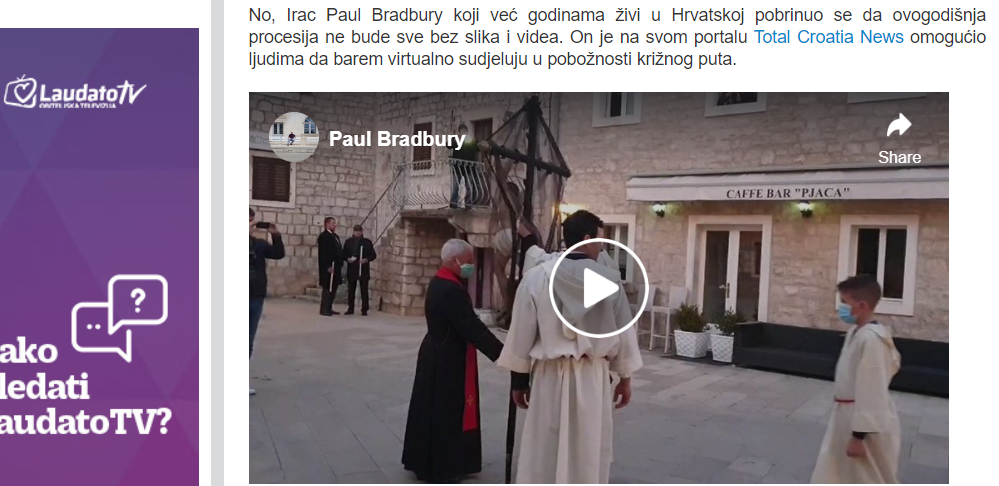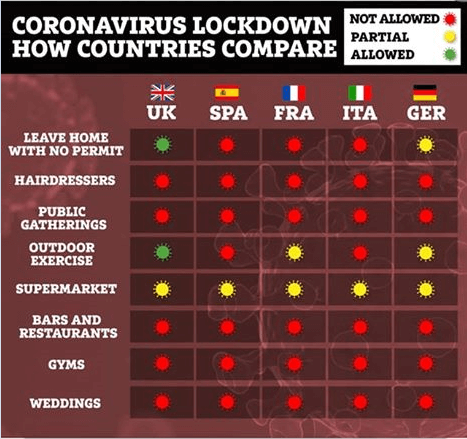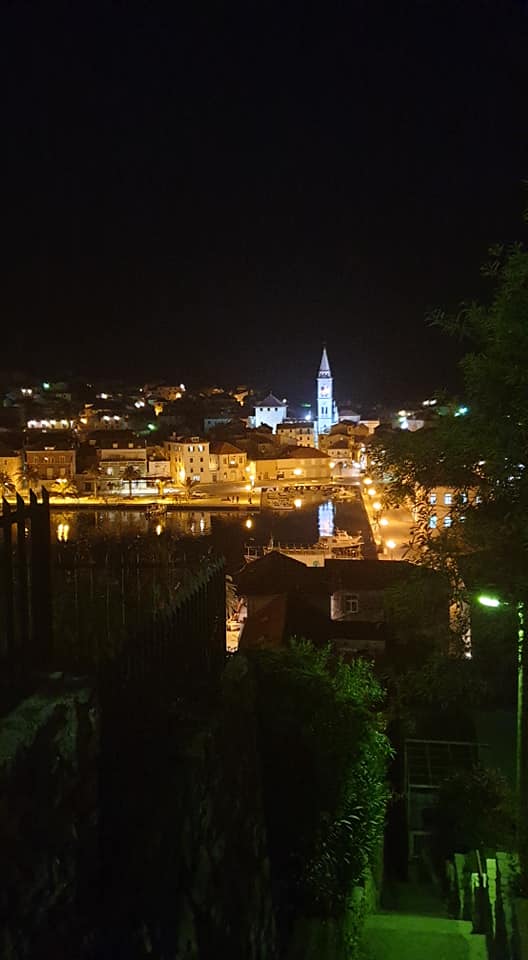Irresponsibility in Coronavirus Era Costs: Will Zagreb Parks Close?
Croatia is not in quarantine, and that's extremely important to point out. People can leave their houses amid the coronavirus pandemic, but not their cities/counties/towns of registered permanent residence. People are free to leave their houses to go to pharmacies and the food stores which remain open as they're of course classed as essential.
What people cannot do, is gather together, wander and sit around aimlessly on benches, on streets or in parks. Social distancing, however it may sound to some, appears to be an effective way of controlling the spread of coronavirus.
Across Facebook, there have been countless posts from people asking if lockdown was over now, because of the amount of people running, jogging, walking and appearing to have very normal family days out in parks. This has unfortunately been especially true in Zagreb, where, ironically, the most coronavirus positive patients are located.
As Poslovni Dnevnik writes on the 11th of April, 2020, in the face of people continuing to break the rules, the National Civil Protection Headquarters has warned that there has been no relaxation to the country's stringent anti-epidemic measures, because any failure to comply with the instructions will only prolong this less than ideal situation and put people's health and in some cases, lives, at even more risk.
As Jutarnji list has unofficially reported, in the next few days, there will be increased control of all areas where the gathering of more people has been recorded.
Failure to adhere to the measures which are firmly in place, for which violations are punishable, more specifically, failure to reduce the crowds on popular promenades, picnic areas and parks would result in the complete closure of such areas, which, in Zagreb in particular, would mean the closure of Bundek, Jarun and even Sljeme.
Make sure to follow our dedicated section on coronavirus in Croatia for rolling updates and important information.
Daruvar Brewery Continues 180-Year Production Despite Coronavirus Pandemic
As Novac/Filip Pavic writes on the 10th of April, 2020, the oldest Croatian brewery, the Daruvar brewery (Daruvarska pivovara) has turned to modernisation during the coronavirus crisis. The Daruvar Brewery, which has been celebrating 180 years since its inception, is now selling its beer online and delivering to home addresses.
''People can order it by e-mail and pay by card to reduce any contact between our sellers with customers,'' explained Siniša Lukač, the director of the Croatian brewery that has been producing beer for almost two centuries in the same location, Count Janković's estate in the very heart of Daruvar.
Production and sales, he added, didn't stop even during the Homeland War, and coronavirus isn't going to make it grind to a halt, either.
Delivery is free of charge and the minimum order is a package of twelve bottles. All this can be ordered by residents of Zagreb, Daruvar, Pakrac, Lipik and the surrounding areas, Nova Gradiska, Novska and the surroundings, as well as Virovitica, Bjelovar and Zabok.
''Since the cafes and restaurants are closed and the shops are crowded, we decided to meet people halfway so they don't have to run the risk of going to the shop and waiting in lines. In this way, we're contribute to the reduction of social contact and respecting the recommendations of the Civil Protection Headquarters to the greatest extent possible,'' emphasised Lukač.
One interesting fact is that the Daruvar brewery is still the only brewery outside of the Czech Republic that produces beer according to traditional Czech technology, and last year, their Fifth Element beer recorded a 30 percent increase in sales, with an additional 25 percent increase in sales for another beer - Staročeško.
Back in 2014, the Daruvar brewery also turned to craft production, a move which saw it introduce Fifth Element among others.
Considering the fact that the Daruvar brewery produces about 250,000 hectolitres of beer a year, during these trying ''coronavirus times'', they say that they are recording a decline, as are all breweries.
''It's clear that beer is not the first choice for people when buying supplies, people have other priorities now. Our production has fallen by 30 percent, and we don't yet know what will happen next. Demand for beer is currently diminished, but that's why our beers are on the shelves of all major shopping centres. It's important that we use this moment for collective awareness. Let's buy Croatian, maybe it's fifty lipa more expensive, but it's not of dubious quality,'' Lukač stated.
Despite all, he noted, the jobs of all sixty Daruvar brewery employees are safe - there will be no layoffs. They have, as he pointed out, people who have worked with them for years, entire generations of families.
''I'd like to note that this brewery has been operating over three centuries, it has seen through two world wars and the Homeland War, and now a global pandemic. It has operated through five countries - the Austro-Hungarian Empire, the Kingdom of the Serbs, Croats and Slovenes, the Kingdom of Yugoslavia, Yugoslavia, and independent Croatia, it has never stopped producing and doing business. We'll do our best to make sure that no matter what, our beer reaches our customers,'' he concluded.
Make sure to follow our dedicated section for all you need to know about coronavirus in Croatia.
Croatian Company Gideon Brothers Presents Robots for Coronavirus Fight
There is no doubt that Croatian companies are as innovative as they are determined. Despite operating in a country which likes to throw spanners in the works of each entrepreneurial step, putting off would-be investors from at home and abroad along the way, many companies manage to succeed, the amazing Gideon Brothers is one of them.
As Poslovni Dnevnik/Bernard Ivezic writes on the 10th of April, 2020, the Croatian company Gideon Brothers, which makes logistics autonomous robots, also wants to manufacture disinfection robots for hospitals in the ongoing coronavirus battle. Gideon Brothers' Matija Kopic, who is the co-founder and CEO of the company, posted a call to the state on Facebook to use his robots in hospitals, schools, shops, hotels and other facilities.
"When, if not now? Something that was unimaginable yesterday is happening to us today, and rapidly. What will the future look like? We don't know that today. But we at Gideon Brothers do know one thing: how to develop the most advanced mobile robots. That's why it's time to send our metal pets out onto the front lines of defense against coronavirus,'' Kopic said.
He has thus posted three robot concepts on Facebook. The first one has UV lamps for indoor disinfection. The second can carry a variety of goods, and the third robot can disinfect.
"In the coming months, Croatian hospitals, schools, shopping centres, supermarkets, hotels, warehouses, factories and other public and private environments can be helped by autonomous mobile robots to: disinfect indoor spaces, transport goods and supplies and detect fever in humans," explained the Gideon Brothers CEO.
He added that they were working on more useful concepts and said that "if we put our knowledge, experience and technology together for the benefit of the Croatian state and its inhabitants, we have a chance of survival in the uncertain future.
"As for the economy? We will continue to build someday, on some healthier grounds. Human lives? They're priceless,'' Kopic concluded.
Follow Made in Croatia for more on Croatian innovation, and follow our dedicated section for rolling information and daily updates on coronavirus in Croatia.
Plenković: No Need to Declare State of Emergency
ZAGREB, April 11, 2020 - Prime Minister Andrej Plenković said on Friday there was no need to declare a state of emergency and that he would continue to support citizens, workers and the economy as well as downsize budget expenditures.
Speaking for Večernji List TV, he said there was no need to declare a state of emergency because both the government and parliament functioned. "They are doing what democratic institutions should."
Plenković said although restrictions had been imposed, there was no curfew or the army in the streets as in some other countries. He added that what the government was doing was appropriate and clear, that people were aware of the seriousness of the situation and that they were mostly responding very responsibly.
The prime minister said the government would propose further measures to help the economy, "adapting to the circumstances." He added that he was glad the measures proposed so far had been supported in public.
Plenković said the government would propose a law to suspend enforcement on monetary funds and other measures benefitting citizens.
He said the government had talked with representatives of the most important state-owned public companies to appeal for cost cutting, making crisis plans and paying a portion of their profits into the state budget.
He refuted media speculation on the establishment of a national crisis management team for the economy. He said that after Easter the government would consider how "experts from the academic community, the private sector and possibly unions" could contribute to making the Croatian economy adapt to "the new normal."
The prime minister underlined the importance of investing in agriculture in the wake of the closure of borders and communication disruptions due to the COVID-19 pandemic, in the digital economy and the digital society as well as in all services necessary to catch up with the fourth industrial revolution.
"The government is thinking about that next step because the most important thing will be how fast an economy stands back on its feet and catches up with new challenges. In that sense we will see that those solutions are good for Croatia and Croatian citizens."
The prime minister said that in this crisis "the state has shown to be quite resilient and effective" and he also highlighted the responsible behaviour of citizens.
Asked if he was satisfied with the behaviour of the opposition, he said it was "playing its game" and had its initiatives but that it had, for the most part, backed all government proposals.
He said the government was doing what it could given the financial situation and that what had been done so far was quite generous.
More news about coronavirus can be found in the Lifestyle section.
Jelsa Za Krizen, Hrvatska Nije Wuhan i Osjecaj Kabinske Groznice
11. travanj 2020. - Odluka da se dopusti održavanje procesije Za Križen u Jelsi izazvala je mnoštvo rasprave. Detaljan izvještaj jedinog stranca koji je prisustvovao cijelom događaju na Hvaru.
Ovo je članak koji zaista ne želim pisati, jer znam da će rezultirati dodatnim napadima i zlostavljanju s nekih strana, bez obzira što napisao, zbog povišenih emocija i osjećaja o ovoj temi. Ali, odlučio sam se ipak napisati ga, jer osjećam da imam moralnu obvezu to učiniti.
Moralnu obvezu iz dva razloga. Prije svega prema stanovnicima Hvara, koji ove godine nisu mogli sudjelovati u petstogodišnjoj tradiciji koju štiti UNESCO, a koja je gotovo dio njihovog DNA - slučajan razvoj događaja doveo je do toga da sam bio jedan od šačice (manje od deset) ljudi bez službene pozicije koji je dobio priliku prisustvovati cijelom događaju i svih šest procesija. Osjećam obvezu podijeliti što više informacija, uključujući i videosnimke i fotografije. Ovdje već možete vidjeti prvi opširan izvještaj (na engleskom jeziku), kao i uređenu video posvetu svakome od šest nositelja križa ovdje.
TCN-ovo izvještavanje o procesiji Za Križen 2020 u Jelsi (a koje je pokrilo i preostalih pet procesija iz Vrboske, Vrbnja, Svirča, Vrisnika i Pitvi) do sada je prenešeno na portalima Bitno.net, Laudato TV, 24 Sata, Index, Tportal, Dalmacija Danas, Telegram, Dalmacija News, Šibenik In, Morski.hr, Maxportal.hr, a pojavilo se i u nacionalnim večernjim vijestima na RTL Danas. Laudato TV čak me nazvao Ircem, a tako su postali prvi portal koji je prihvatio moju post-Brexit stvarnost.
Intenzivan interes medija za naš rad imao je manje veze s kvalitetom onoga što smo proizveli, a puno više, naravno, s činjenicom da sam zbog trenutačnih ograničenja kretanja bio jedan od malog broja novinara u zemlji koji su mogli prisustvovati događaju.
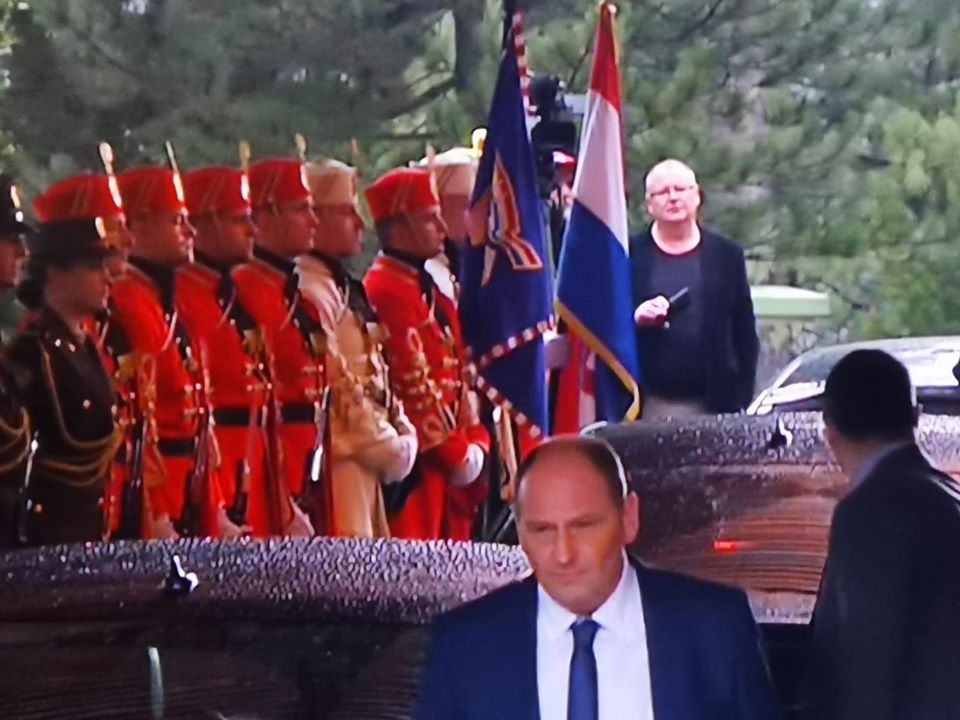
Bila je ovo po tom pitanju čudna godina za TCN, budući da smo kolega i ja bili jedini stranci na inauguraciji Predsjednika Milanovića prije par mjeseci. Više o dojmovima stranca s hrvatske predsjedničke inauguracije pročitajte ovdje.
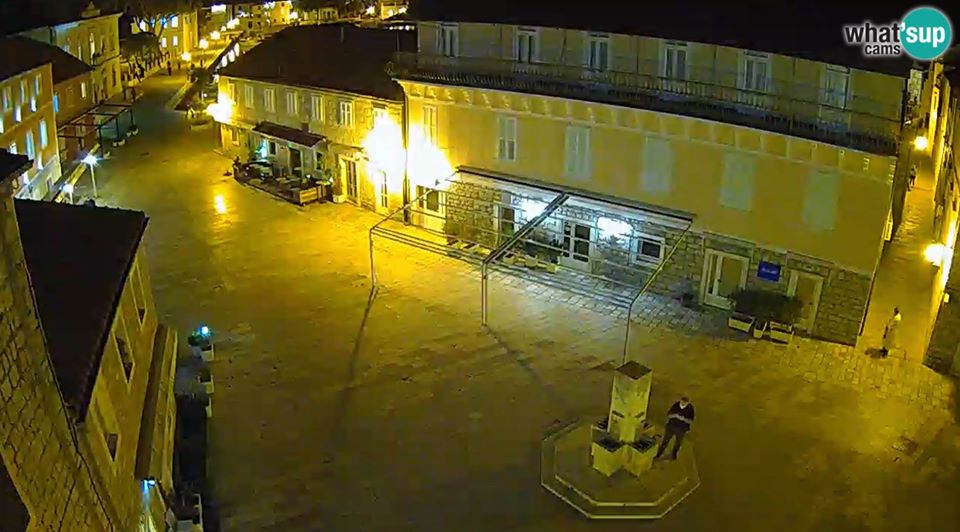
A onda, još čudniji osjećaj: početak procesije Za Križen u Jelsi u četvrtak. Ne samo da sam bio jedini stranac na glavnom trgu, nego sam bio i jedina osoba.
Meni se čini da postoje tri aspekta ove odluke koji su raspirili emocije.
1) Društveno distanciranje
2) Ljutnja što su mnogi drugi događaji otkazani, a ljudi zatvoreni u svoje kuće, a istovremeno je procesija Za Križen dopuštena.
3) Kako se približava Uskrs, važno vrijeme za obitelji u Hrvatskoj, dopuštanje odvijanja ove procesije može poslati pogrešnu poruku.
Neću se doticati posljednjih dviju točaka, jer moje mišljenje nije bitno, a i davno sam naučio da uskakivanje u polarizirane debate dovodi do otklizavanja u rasprave o ustašama i partizanima u par minuta. Ali, imam mnogo toga reći o prvoj temi, kao i dodati nešto vrijednosti u raspravu, budući da sam imao pristup cijeloj procesiji.
Prije nego što krenem, mislim da je bitno napomenuti da ljudi imaju različita iskustva i perspektive, ovisno o tome koliko im je kretanje ograničeno i nalaze li se s nekim, i s kim točno, u izolaciji. I iako ne mogu zamisliti kako je biti zatvoren u Zagrebu s koronom vani a potresima unutra, brinem se i za prijatelja koji je na idiličnom karipskom otoku koji je upravo zabilježio prvu smrt od Covida-19. Nema nikakve šanse naći se na letu s otoka, a otok ima 10 bolničkih kreveta i 2 respiratora. Posve drukčiji zatvor, ako ga usporedimo sa Zagrebom, a možda čak i još više zastrašujući, bez obzira na sunce i mogućnost odlaska na plažu.
Nijedno mjesto nije savršeno za biti dok sve ovo prođe i posve prihvaćam da su okolnosti u sunčanoj Jelsi mnogo bolje nego na mnogim drugim mjestima. Da smo ostali u našoj kući u Varaždinu, vjerujem da bismo se poubijali, a iako su zdravstveni resursi na otoku ograničeni, Split nije daleko a hrvatske hitne službe rade fantastičan posao iako su već desetljećima slabo financirane.
Dio naslova je da Hrvatska nije Wuhan. Postoji razlog za to, iako sam svjestan da će neki to vidjeti kao obični clickbait. Želim dodati jedan pasus o clickbaitu u ovu raspravu prije nego što nastavim, jer je to važan aspekt ove debate. Sada prolazimo kroz eru vrhunca clickbaita, a neki medijski članci o ovoj procesiji dobrano su se tome prepustili.
Iako ne osuđujem portale koji provode politiku clickbaita (više o tome zašto malo kasnije), to je nešto čemu se urednički snažno protivim na TCN-u. Iako ne možemo to uvijek postizati, budući da imamo mnoštvo suradnika i opuštenu politiku objavljivanja, kvaliteta nam je značajno važnija od brze gotovine koju mogu pružiti klikovi vođeni histerijom. Po mom mišljenju, kratkotrajni financijski dobitak s druge bi strane doveo do gubitka kvalitetnih čitatelja, koji bi ispravno zaključili da smo clickbait stranica.
Zašto onda ne osuđujem druge portale? Prihod od Adsensea je ključan prihod za medijske portale ovih dana, a prihod od Adsensea stvaraju klikovi. Što imate više klikova, to više zarađujete. Što imate više clickbait članaka, to imate više klikova i više novca. Trenutačna financijska situacija na TCN-u je takva da nam je doslovno svaki klijent zamrznuo suradnju - tijekom posljednjih tri mjeseca. Bolno ali razumljivo. I u međuvremenu nam se jedan klijent vratio i novi nam se klijent priključio jučer, ali to znači da je punih mjesec dana JEDINI izvor prihoda za TCN bio prihod od Adsensea. Dakle, da bih nahranio svoju djecu, u interesu mi je bilo privući klikove na našu stranicu. Pa je pitanje bilo, raditi kompromise po pitanju kvalitete ili zamoliti djecu da nešto manje jedu? To je dio rasprave o clickbaitima koji se rijetko spominje.
Žao mi je, djeco, odlučio sam se za kvalitetu ALI dobra vijest je da se klijenti vraćaju i dolaze nam i novi, pa ćemo uskoro moći ponovo dobro jesti. I, da, šalim se o tome imaju li mi djeca što jesti - kada imate privilegiju pristupa kvalitetnih proizvoda svoga punca i legendarne Konobe Zorica koju vodi vaša punica, nitko neće umrijeti od gladi.
Oprostite mi na dugom uvodu, ali mislim da je bio bitan kako biste shvatili ovu kompleksnu situaciju.
Pa počnimo. Pa zašto Hrvatska (niti bilo koje drugo mjesto na svijetu) nije Wuhan? Pogledajte na grafiku koja pokazuje razinu restrikcija u nekim evropskim zemljama. Dok je Wuhan imao potpuni "lockdown", u svim ovim zemljama, uključujući i Hrvatsku, on je bio samo djelomičan.
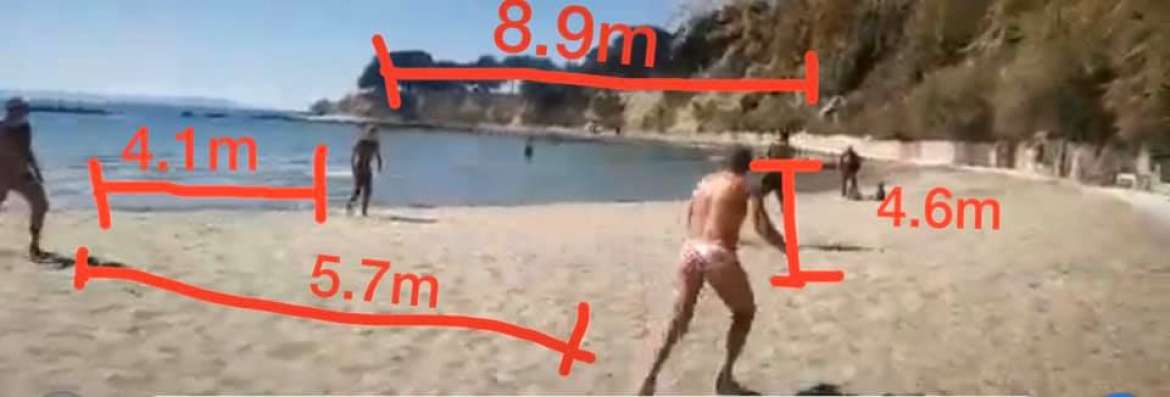
Ovo je Split krajem prošlog mjeseca, gdje su domaći ljudi uživali u tradicionalnoj igri picigina na proljetnome suncu. Zadržavali su prikladnu društvenu distancu, a i pravila igre čini se da ne dopuštaju da igrači budu unutar metra jedan od drugoga. Prenošenje virusa na lopti posve je drugi aspekt ove igre. Ali, ovo je i izvrstan vizualni primjer onoga što se trenutačno događa u Hrvatskoj. Većina, ali ne i svi, se pridržavaju pravila i održavaju prikladan razmak. Pitao sam profesora Igora Rudana, jednog od vodećih globalnih eksperata za pitanja pandemije koje je njegovo mišljenje o toj fotografiji u članku Jurgen Klopp and Igor Rudan: the Only COVID-19 Opinions You Need. Njegov odgovor u jednoj rečenici bio je:
Mogu samo reći da, ako napustite svoj dom, niste više posve sigurni, jer i dalje ne znamo kako se ovaj virus tako lako širi. Dok to ne saznamo, ja bih radije ostao doma.
Njegovu mnogo dužu i iznimno informativnu analizu možete pronaći na engleskom jeziku ovdje: How to Maintain Good Results and Exit Quarantine as Soon as Possible.
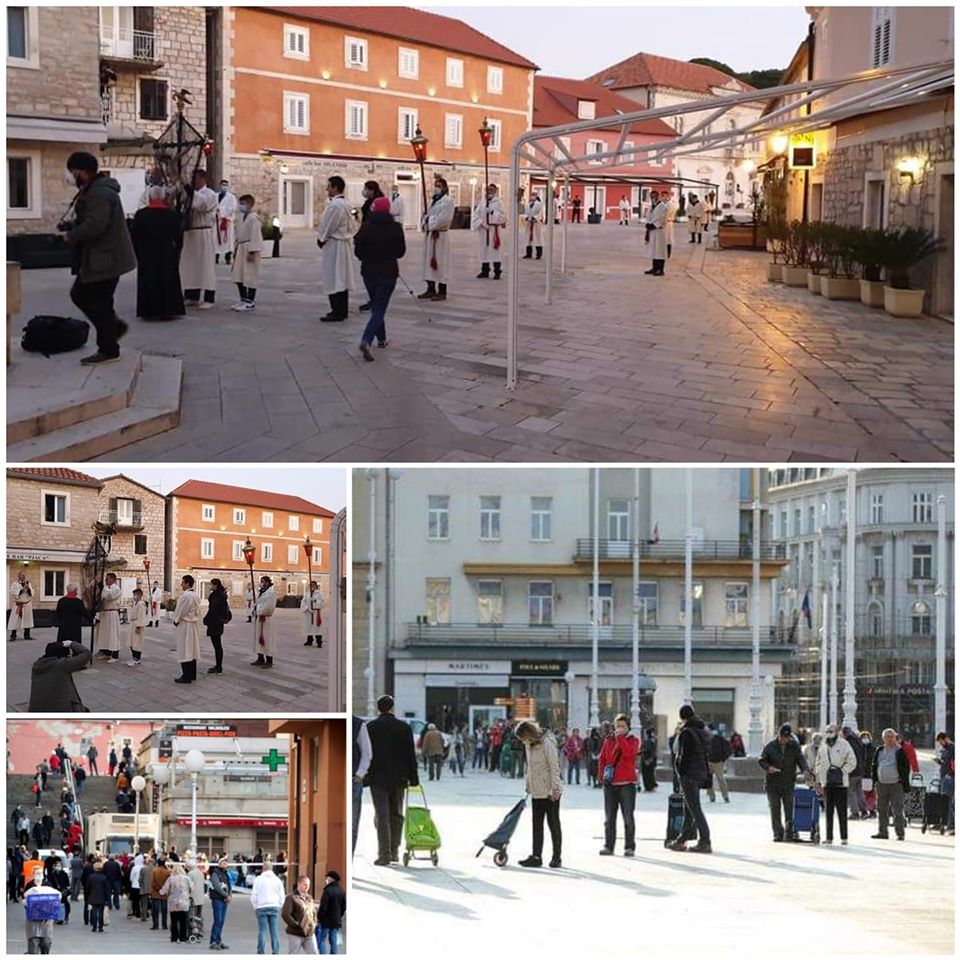
Je li tijekom procesije Za Križen bilo kršenja pravila društvenog distanciranja? Da.
Jesu li ta kršenja bila gora od trenutačne situacije diljem Hrvatske? GLASNO NE, DAPAČE, MISLIM DA JE STANJE BILO MNOGO, MNOGO BOLJE
Dajte mi kameru i pristup bilo kojem gradu u Hrvatskoj sa zadatkom da pokažem šokantna kršenja pravila društvenog distanciranja, i napravit ću vam svaki dan novi clickbait članak pa će me na kraju djeca moliti da im prestanem kupovati toliko čokolade. I ono što bih uspio uhvatiti možda će biti istina, ali neće biti reprezentativno za cijelu zemlju.
Ili, recimo to na drugi način. Koliko ste često, ako ikad, prošetali susjedstvom u kojem živite u Hrvatskoj i primijetili da se 100% vaših susjeda pridržava propisanih pravila?
Nisam očekivao da će tijekom procesije Za Križen biti besprijekorno društveno distanciranje, ali mislim da to ni nitko drugi nije očekivao. Veliko je pitanje - barem se meni tako činilo - bilo koliko će se ostvariti bliskoga kontakta i koliko će ljudi kršiti pravila. I OVO je meni bila priča te večeri i razlog zašto moje poštovanje prema ljudima s Hvara nikad nije bilo veće.
Trenutačno u Jelsi ne smijemo napuštati svoju općinu, ali smijemo otići u šetnju, ako se držimo pravila o prikladnoj udaljenosti. Ovo znači da si svaki dan smijem priuštiti 30 minuta uz Jadran, što me održava koliko-toliko normalnim. Ali to također znači da su ljudi iz Jelse mogli legalno izaći na ulice i na neki način sudjelovati u procesiji. To bi neminovno dovelo do mnogo više kontakata i kršenja pravila, da se dogodilo. A budući da je Za Križen TOLIKO važan dio lokalnog genetskog koda, to se moglo očekivati. Pa što se zaista dogodilo, i kako su vlasti kontrolirale stvari? Evo mog iskustva iz i oko Jelse, najvećeg naselja od šest koji sudjeluju u procesiji. Bio sam vani cijelu noć i imao priliku prisustvovati većini onoga što se dogodilo.
Prvi pozitivan znak (a i iznenađenje) dogodilo se na vrhu stepenica (pogledajte fotografiju iznad) kojima se spuštam do rive. Stepenice je svojim autom blokirao Ivo Tomić, moj stomatolog, koji je ispunjavao svoju ulogu svjesnog građanina ograničavajući kretanje. Ivo je unaprijed znao da ja imam dozvolu sa sigurne udaljenosti prisustvovati procesiji, te mi je samo mahnuo da prođem.
Trebao bih objasniti i ovo s dozvolom. Nazvao sam voditelja lokalnog Stožera, Igora, da mu kažem da planiram šetati se oko procesije, prema pravilima, ali da sam htio s njim provjeriti je li to u redu, s obzirom na osjetljivo vrijeme u kojem živimo. Igor me uputio da se javim Juri Tadiću, šefu policije Hvara, koji je to dopustio, ali i predložio da to potvrdi i načelnik općine Jelsa, Nikša Peronja. Načelnik Peronja potvrdio je to mailom.
I onda me nekoliko sati prije procesije nazvao policijski šef Tadić. Protrnuo sam. Jedina misao kad sam vidio da me on zove bila je da mora da mi javlja da ipak moram ostati doma. No, upravo suprotno, zvao je pitati me gdje točno planiram biti i rekao mi je da se, ako budem imao bilo kakvih problema, slobodno njemu direktno javim. Hvala vam, gospodine, cijenim to.
A onda dalje na glavni trg, gdje je glavna akcija uskoro trebala početi...
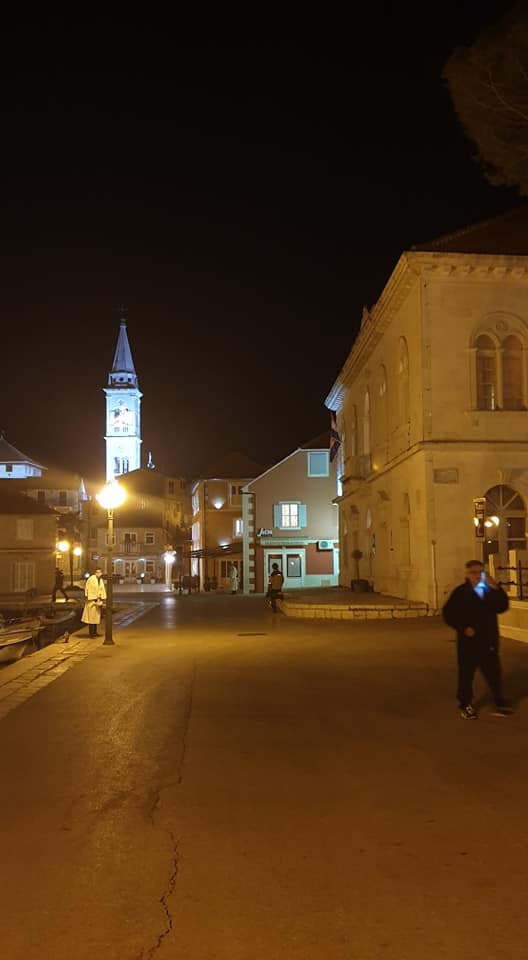
Nije bilo moguće doći na trg ako niste imali dozvolu. Meni su samo mahnuli da prođem.
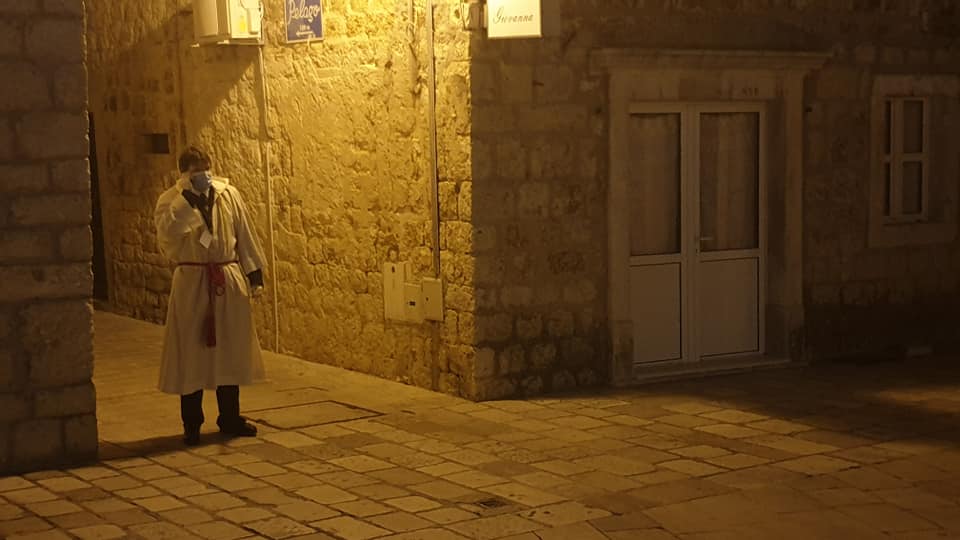
Svaki ulazak bio je blokiran.
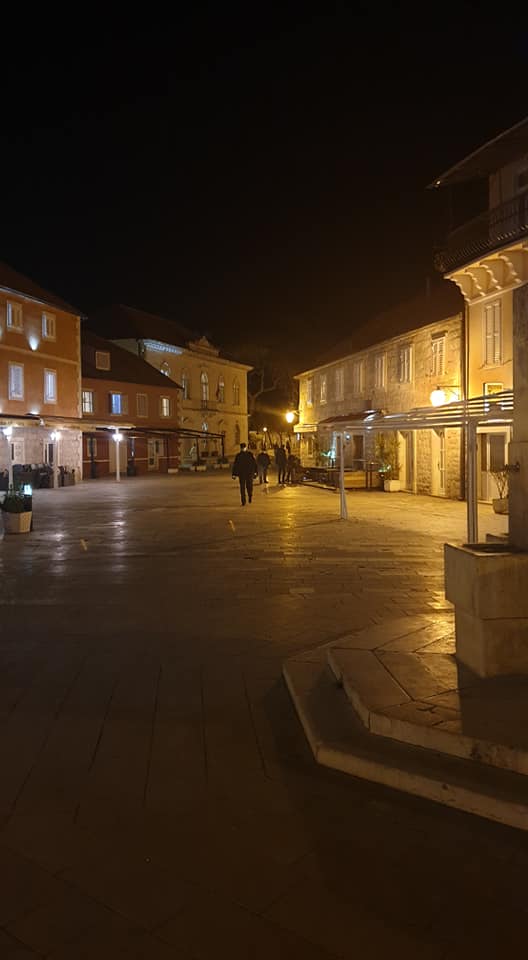
Moj pogled na trg u 22 sata, kada je procesija trebala krenuti.
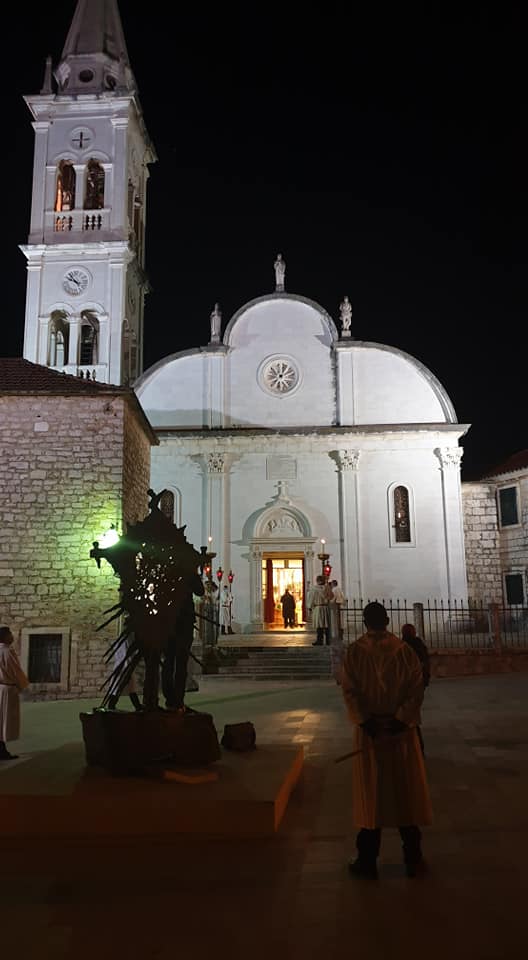
Glavna crkva u Jelsi inače je prepuna hodočasnika koji gledaju a kasnije slijede početak procesije. Ne ovoga četvrtka.
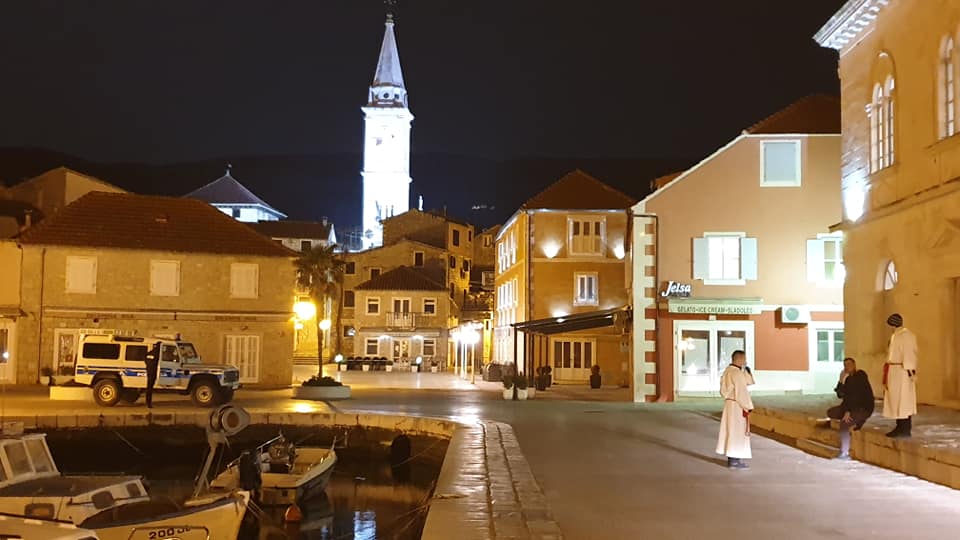
I ta se kontrola nastavila kroz cijelu noć. 00:30, dok smo čekali na procesiju iz Vrbnja.
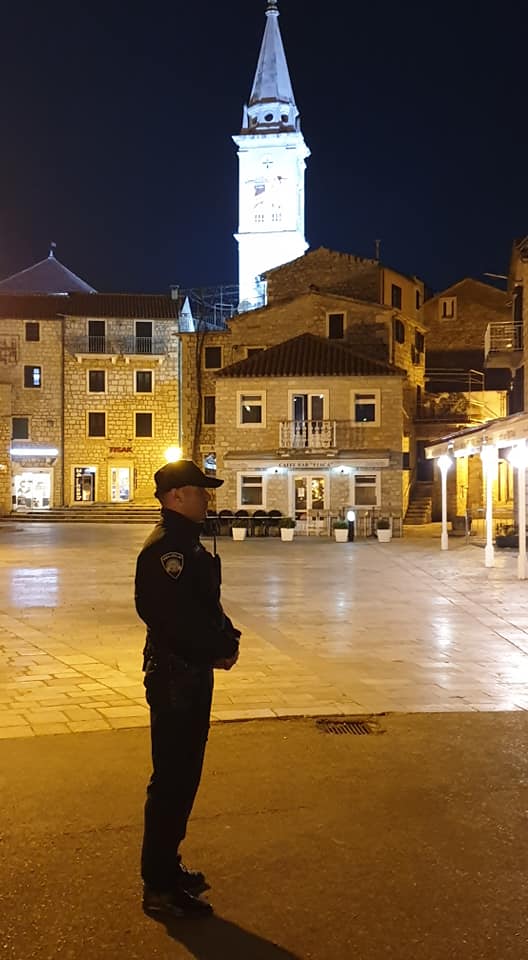
Šef policije Hvara Jure Tadić savršeno je vodio operaciju cijelu noć.
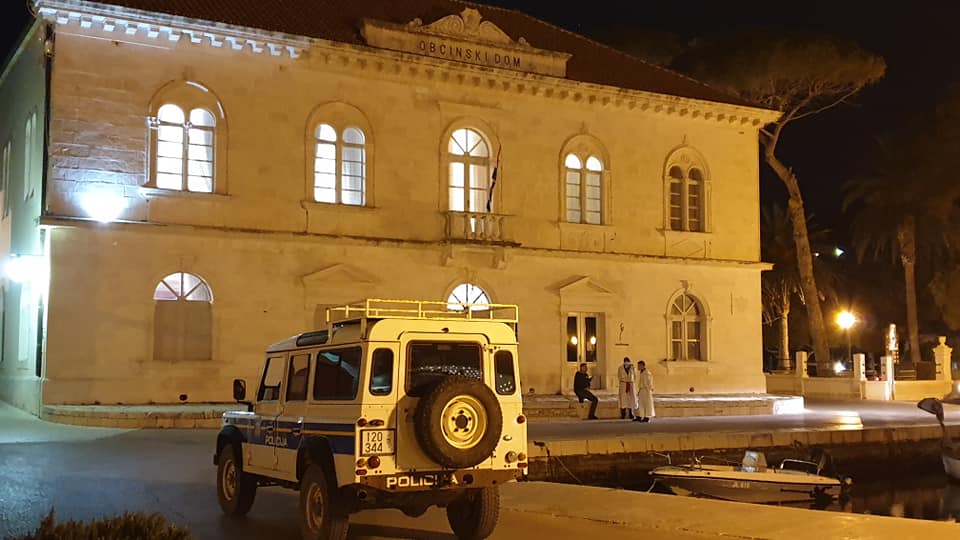
Ali, glavno iznenađenje bilo mi je to koliko je malo ljudi uopće bilo na ulicama. Neki su odabrali svoje mjesto na ruti procesije i kako se procesija kretala po ulici koja vodi iz grada, bilo ih je možda dvanaestak, međusobno udaljenih više metara. Kako je procesija prolazila, tako su se niz lice jedne domaće žene slijevale suze. Da sam ja clickbait novinar, to bi bila glavna fotografija uz ovogodišnju procesiju. Nisam pitao radi li se o suzama radosnicama što se procesija ipak odvija, suzama frustracije što ne može sudjelovati, ili suzama zbog cjelokupne situacije u kojoj se nalazimo. Kako god bilo, meni je iskristaliziralo što točno procesija Za Križen znači ljudima Jelse, Pitvi, Vrisnika, Svirča, Vrbnja i Vrboske.
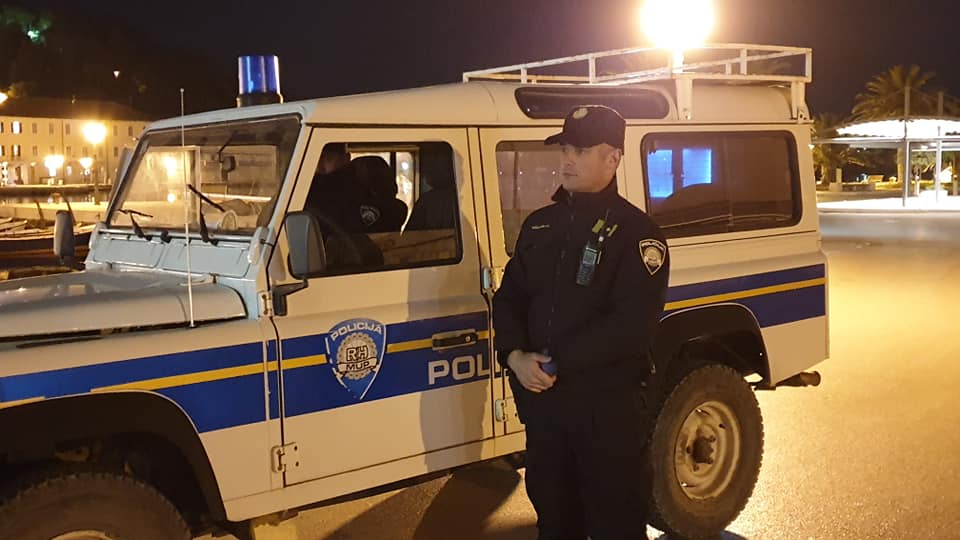
A onda je bilo očito da se ne može proći pokraj policije na kopnu...
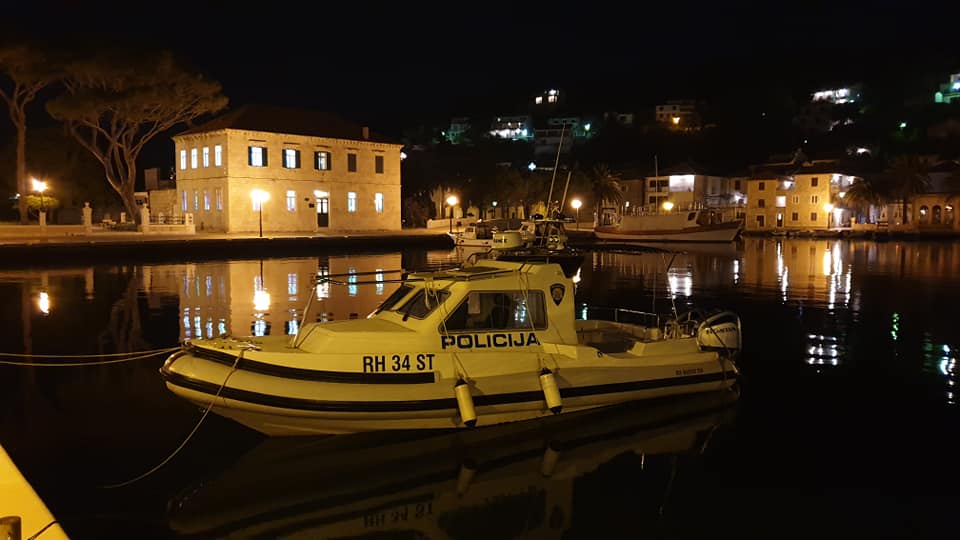
... ili na moru.
Ali što će se dogoditi kad se procesija vrati u Jelsu ujutro? Sigurno će se tad ljudi okupiti? Da biste dobili osjećaj, evo kako je završila procesija Za Križen u Jelsi 2019. godine.
Meni je to najsretnije doba godine u Jelsi, jer su energija i veselje u kafićima koje se pruža hodočasnicima nakon njihovog 9-satnog iskustva tijekom noći nešto zaista čarobno.
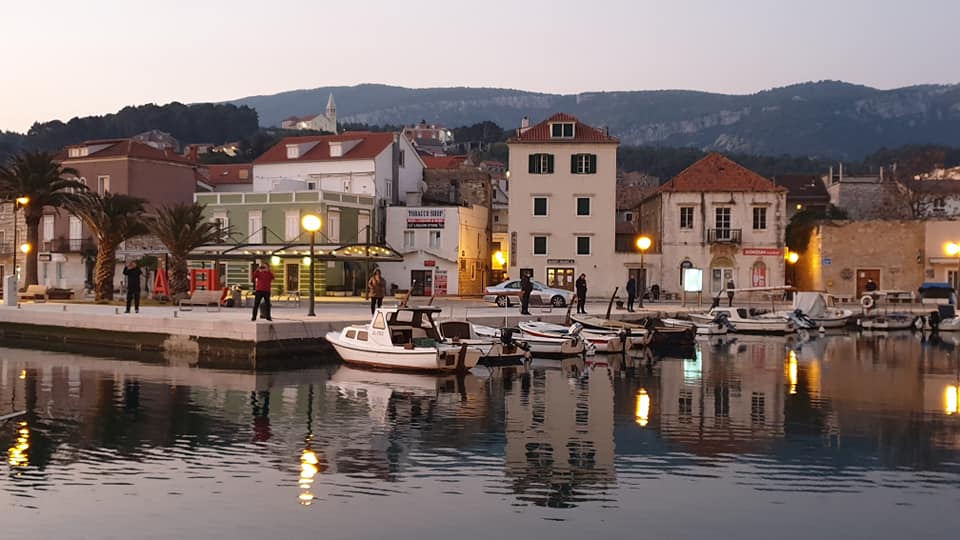
Dođimo brzo do 2020., kada prikladno međusobno udaljeni Jelsani očekuju povratak njihove procesije. Bio sam potpuno šokiran. I potpuno ponosan.
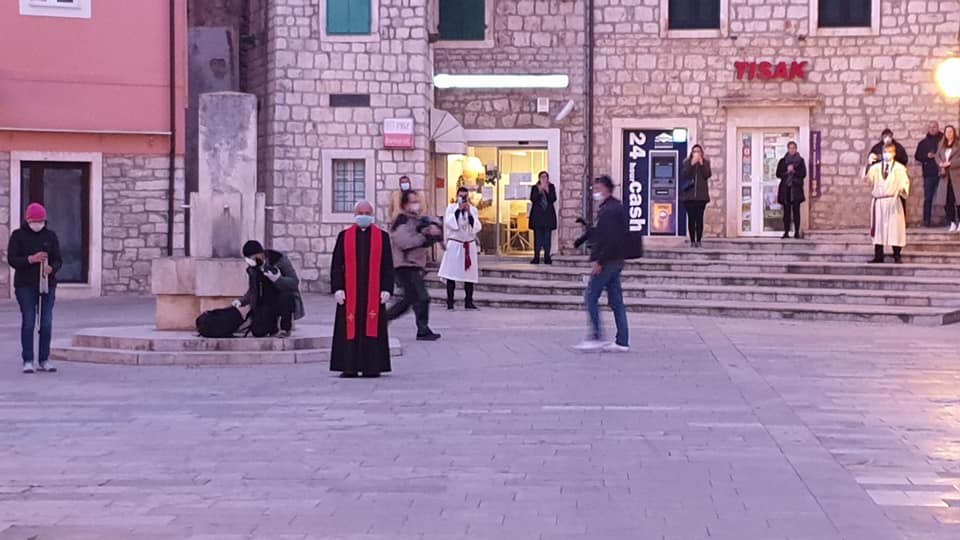
Čekali su samo Don Stanko i šačica drugih ljudi.
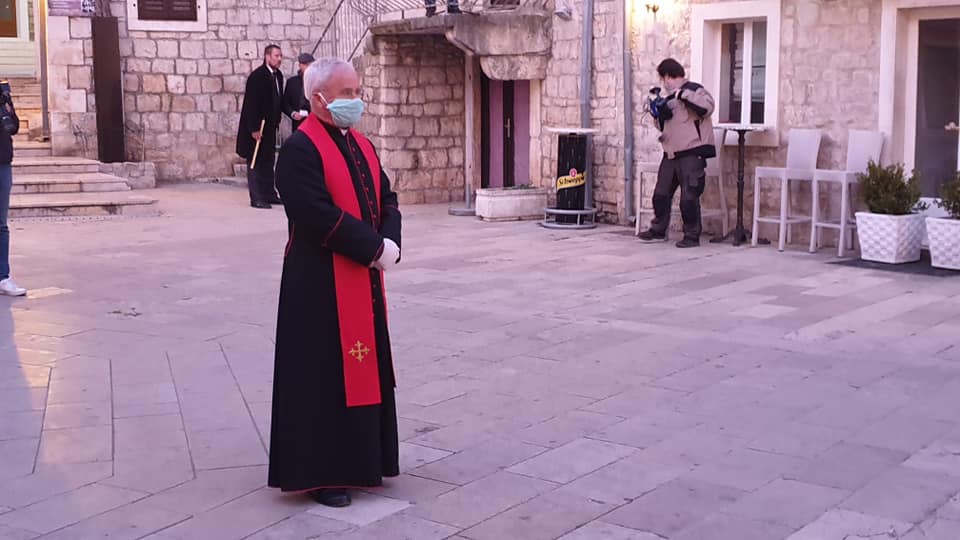
Još jedna od snažnih fotografija procesije 2020.
Možete vidjeti dolazak križa u ovoj video-montaži koju je priredila Miranda Miličić Bradbury, a koja uključuje neke fantastične snimke prolaska procesije prema crkvi Sv. Ivana. Ovo je neprikosnoveni vrhunac te noći.
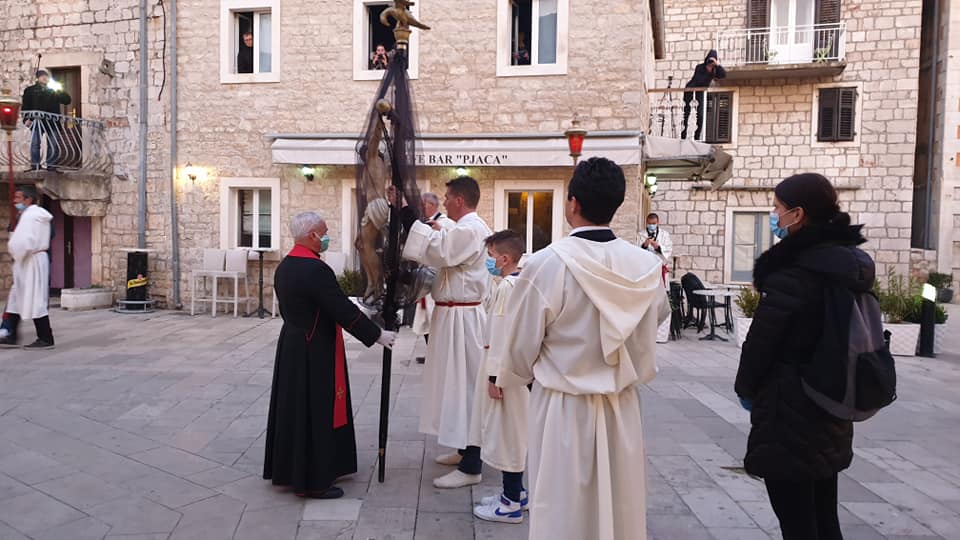
I najgore kršenje pravila međusobne udaljenosti tijekom cijele procesije, ali i dalje nešto što se događa u svakom uglu Hrvatske. Iz perspektive društvene distance, Za Križen nije bila ništa gora - a vjerojatno i nešto bolja - od onoga što se trenutačno događa diljem Hrvatske. Druge dvije teme debate koje sam gore spomenuo svaka su zasebna rasprava, ali po mom mišljenju, nema ni jednog razloga da se u Hrvatskoj uopće debatira o kršenju društvene distance tijekom procesije Za Križen. Bi li bilo bolje da se Za Križen ove godine nije dogodila, jednako kao što su otkazani mnogi drugi događaji u Hrvatskoj tijekom kojih dolazi do ozbiljnih kršenja pravila? Uz naklon bih se složio s profesorom Rudanom i rekao da da.
Ali, Hrvatska nije Wuhan i to je odluka koju su donijele hrvatske vlasti, jednako kao i neki ljudi u Hrvatskoj, koji osobno čine postupke koji dovode do kršenja pravila društvene distance.
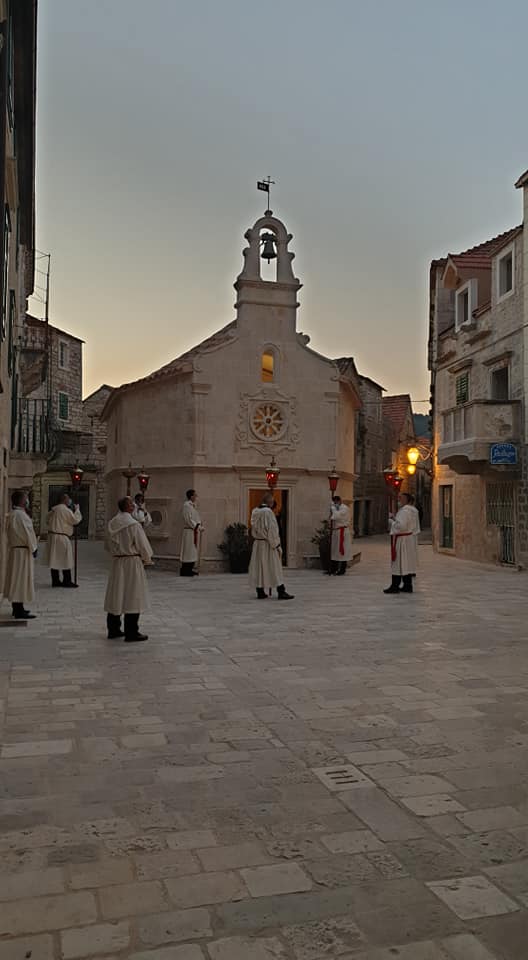
Moja se priča završava. Trg Sv. Ivana.
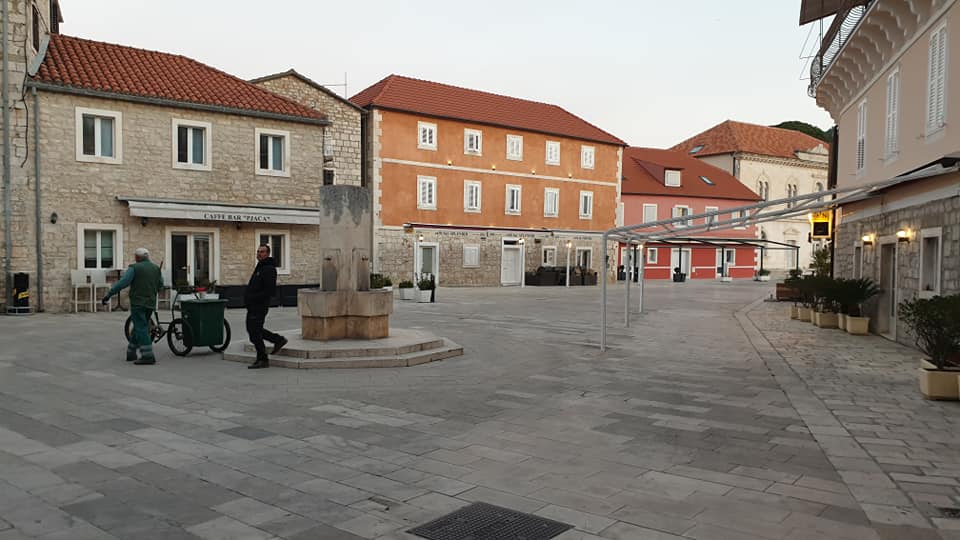
Glavni trg u Jelsi, pet minuta nakon dolaska procesije.
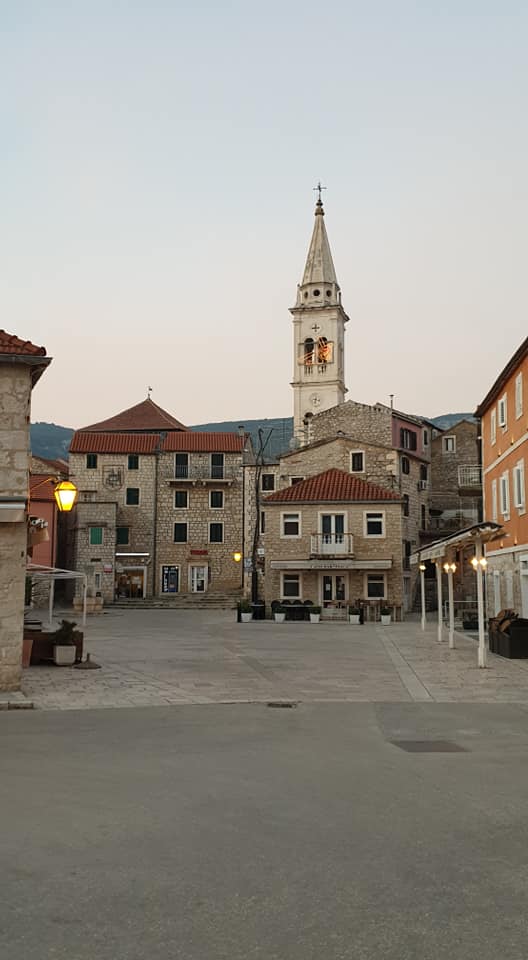
I pogled s rive.
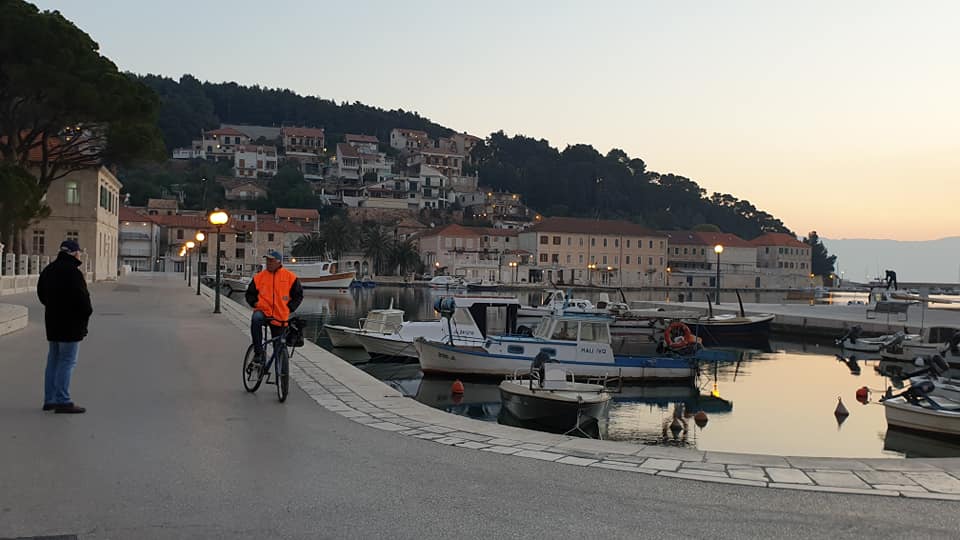
Samo jedan ranojutarnji razgovor, uz prikladan razmak, koji prekida tišinu.
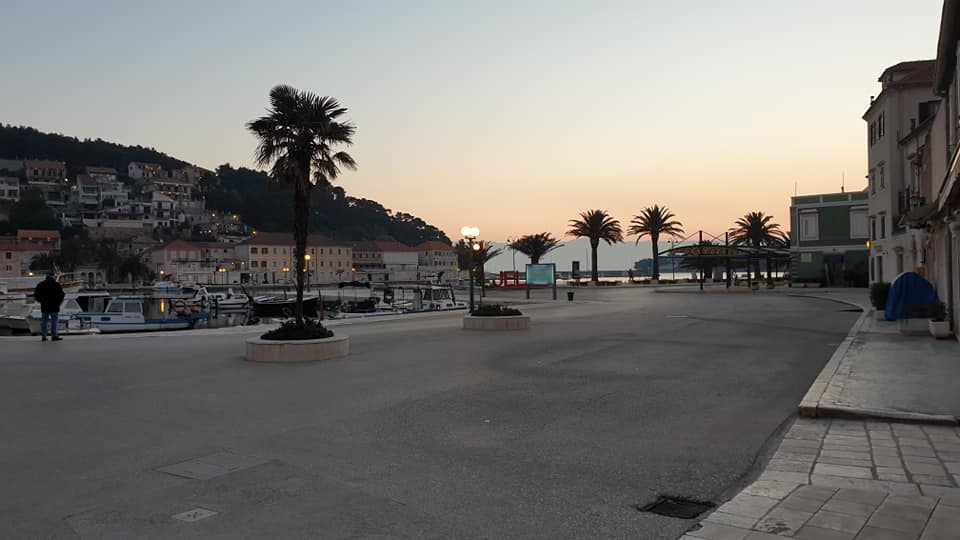
Mir i tišina praznog ranog jutra, koje sam naučio cijeniti tijekom svog boravka ovdje.
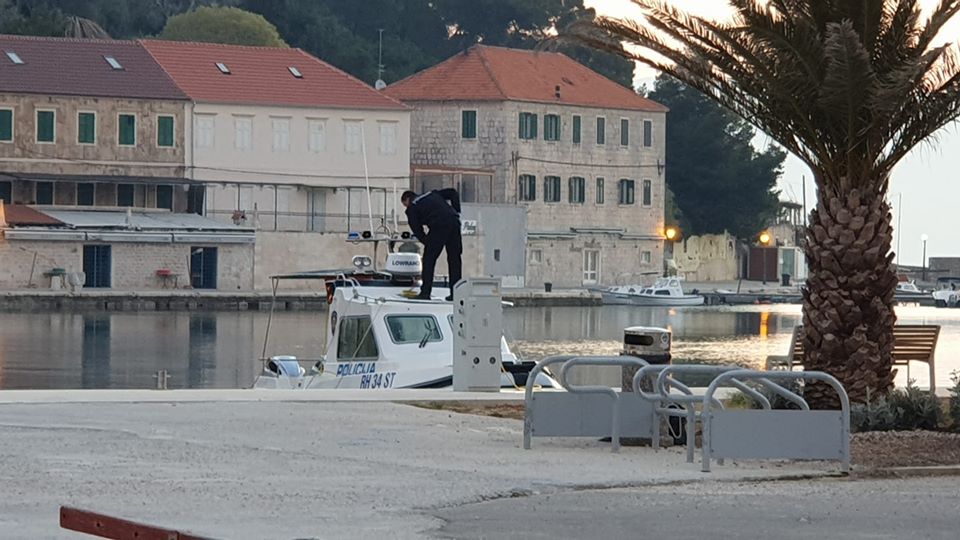
I posljednja fotografija posljednjeg policijskog postupanja u ovoj izvanredno provedenoj operaciji: dezinficiranje svoga plovila.
Moja zahvala i poštovanje svima onima koji su ostvarili da Za Križen 2020 bude uspješna u iznimno zahtjevnim okolnostima.
Nadam se da će ovaj izvještaj donijeti nešto jasnoće u raspravu, kao i nešto više informacija i fotografija onima kojima je procesija Za Križen draga.
Možete vidjeti više izvještaja o procesiji Za Križen 2020, uključujući i video snimke prethodnih procesija, na posebnoj stranici TCN je posvetio toj temi.
Jelsa Za Krizen, Croatia Not Wuhan & Cabin Fever Perspectives
April 11, 2020 - The decision to allow the Jelsa Za Krizen procession to proceed has caused plenty of debate. A detailed account from the only foreigner to witness the whole event on Hvar.
(CROATIAN VERSION OF THIS ARTICLE)
This is an article I really do not want to write, since I know it will lead to more attacks and abuse from some quarters, no matter what I write, due to the high emotions and feelings about the subject. But I have decided to write it because I feel I have a moral obligation to do so.
A moral obligation for two reasons. Firstly to the people of Hvar, who were unable to take part in this 500-year-old UNESCO tradition which is almost part of their DNA - a chance turn of events meant that I was only a handful (less than ten) of people outside officialdom who got to witness the whole event and all six processions. I feel a duty to share as much information, including videos and photos as I can. You can already see the first comprehensive report here, as well as an edited video tribute to each of the six cross bearers here.
TCN's coverage and videos of the Jelsa Za Krizen 2020 (which also covered the other five processions from Vrboska, Vrbanj, Svirce, Vrisnik and Pitve) has already been featured in Bitno.net, Laudato TV, 24 Sata, Index, Tportal, Dalmacija Danas, Telegram, Dalmacija News, Sibenik In, Morski.hr, Maxportal.hr, as well as appearing on the national evening news on RTL Danas. Laudato TV even referred to me as Irish, the first portal to note my post-Brexit reality.
This intense media interest in our work had less to do with the quality of what we produced and more, of course, with the fact the current travel restrictions meant that I was one of the only journalists in the country who could attend the event.

It has certainly been a strange year for TCN in that regard, as my colleague and I were the only foreigners at the inauguration of President Milanovic a couple of months ago. You can read more about a foreign perspective on a Croatian presidential inauguration here.

And then, an even stranger feeling. at the start of the Jelsa Za Krizen procession on Thursday. Not only the only foreigner on the main square but also the only person.
As far as I can see, there are three aspects of the decision which have flared emotions.
1) Social distancing.
2) Anger that while other events are cancelled and people are confined to homes, Za Krizen went ahead.
3) With Easter approaching, such an important family time for Croatians, allowing the procession to proceed sent out the wrong message.
I am not going to touch the last two topics, since my opinion does not matter, and I learned a long ago about jumping into polarised debates that will descend to Ustasa v Partizani in minutes. But I do have a lot to say on the first topic, as well as value to add to the discussion due to my close access to the entire procession.
Before I do so, I think it is also important to mention that everyone is having a different experience and perspective based on how confined they are and who they are (or are not) locked down with. While I can't imagine what I must be like caged in Zagreb with corona on the outside and earthquakes on the inside, I worry too about a friend on an idyllic Caribbean island which just registered its first corona death. With no chance of flights out, the island only had 10 hospital beds and two respirators. A different kind of prison compared to Zagreb, and perhaps even more terrifying despite the sun and access to the beach.
No place is perfect to sit this one out, and I fully acknowledge that my circumstances in sunny Jelsa are much better than many others. Had we stayed in the house in Varazdin, we would have ended up killing each other for sure, and while health facilities on the island are limited, Split is not far away, and Croatia's emergency services do an outstanding job despite decades of underfunding.
Part of the title is 'Croatia not Wuhan.' There is a reason for that, although I am aware that some may see this as clickbait. I want to add a paragraph on clickbait to the discussion before I proceed because it is an important aspect of the debate. There has never been a greater era of clickbait than today, and some media articles on this procession have indulged in that.
While I do not judge portals which do engage in a policy of clickbait (more on why in a minute), it is something I strongly oppose on TCN editorially. Although we don't always achieve it, given the number of contributors we have and the relaxed publishing policy, quality is of much more importance than quick cash from hysteria-driven clicks. In my opinion, the short-term financial gain would be offset by the loss of quality readers who would rightly conclude that we were a clickbait site.
So why don't I judge other portals? Adsense revenue is an essential revenue stream for media portals these days, and Adsense revenue is generated by clicks. The more clicks, the more cash you make. The more clickbaity articles, the more clicks, the more cash. TCN's current financial status is that every single client we had put our cooperation on hold, every single one - over a period of three days last month. Painful but understandable. While one has now come back and we picked up a new client yesterday, this has meant that for a month, the ONLY revenue stream for TCN has been Adsense revenue. So in order to feed my kids, it is in my interest to attract clicks to the site. So do I compromise on quality, or ask the kids to eat less? That is a part of the clickbait debate that rarely gets discussed.
Sorry kids, I went for quality BUT the good news is that clients are coming back and new ones committing, so we will be able to eat well again real soon. And yes, I am joking about not having food for the kids - when you have access to the quality produce of your punac and the legendary Konoba Zorica run by your punica, nobody will starve.
Sorry for the long intro, but I think it is necessary to have a better understanding of this complex situation.
Let's begin. So why is Croatia (or anywhere else in the world) not Wuhan? Look at the chart above on the level of restrictions in some European countries. While Wuhan had total lockdown, these countries and Croatia have partial lockdown.

This is Split late last month, where locals were enjoying a traditional game called picigin in the Spring sunshine. They were appropriately socially distanced, and the rules of the game apparently mean you can not be within one metre of another player. Passing the virus on via the ball is another aspect to the game, however. But this is also a great visual example of what is currently happening in Croatia. MOST but not ALL are adhering to the rules and appropriate distancing. I asked Professor Igor Rudan, one of the leading global experts on pandemics what was his opinion of the above photo in Jurgen Klopp and Igor Rudan: the Only COVID-19 Opinions You Need. His one-line answer was:
I can only say that, if you leave home, you are no longer safe, because we still have no idea how this virus can spread so easily. Until we do, I would rather stay in.
His much longer, and highly informative analysis can be found in How to Maintain Good Results and Exit Quarantine as Soon as Possible.

Were there social distancing violations at Za Krizen? Yes
Were they worse than the current situation all over Croatia? An EMPHATIC NO, INDEED MUCH, MUCH BETTER
Give me a camera and access to any city in Croatia with a brief to show the shocking abuse of social distancing rules, and I will have a daily clickbait article which will have my kids begging me to stop buying them so much chocolate. While what I capture might be true, it would not be representative.
Or let's put is another way. How often, if ever, have you been out in the neighbourhood where you live in Croatia and seen 100% adherence to the social distancing rules?
I never expected Za Krizen to have total social distancing, and I don't think anyone else did. The big question - to me at least - was how much close contact there would be, and how many people would violate. And THIS to me was the story of the night and the reason why my respect for the people of Hvar has never been higher.
Currently in Jelsa, we are not allowed to leave the area, but we are free to go for a walk, if we are appropriately socially distanced. This means that I can get my 30 minutes a day by the Adriatic which is keeping me sane. But it also meant that all the locals could legally come out and take part in the procession in some way. That would necessarily lead to a lot more contact and violations if it were to happen. And with Za Krizen SUCH an important part of the local genetic makeup, it was to be expected. So what actually happened, and how did the authorities control things? Here is my experience in and around Jelsa, the biggest of the six settlements. I was out all night so had the chance to observe the most.
The first reassurance (and surprise) came at the top of the steps (see above) I use to go to the riva. It was blocked by the car of my dentist, Ivo Tomic, who was doing his bit as a good citizen to limit movement. Ivo had been informed that I had been given permission to attend the procession from distance and waved me through.
I should mention at this point about the permission. I called the head of the local Stozer, Igor, to say that I planned to wander around, as per the rules, but just wanted to check if that was ok, as I knew it was a sensitive time. Igor referred me to check with Jure Tadic, the Hvar Police Chief, who gave his blessing but suggested I get confirmation from Jelsa Mayor, Niksa Peronja. Mayor Peronja confirmed by email.
And then a few hours before the procession Police Chief Tadic called me. My heart sank. The only reason for the call must be to tell me to stay home, I thought as his number flashed up. But quite the contrary, he wanted to know exactly where I planned to be, and to let me know that if I had any problems, to call him directly. Thank you, Sir, that was much appreciated.
And so to the main square, where the main action would soon begin...

No chance to get to the square unless you had permission. I was waved through.

Every entrance was blocked.

My view of the square at 22:00, when the procession was due to start.

The main church in Jelsa is normally packed with pilgrims watching, and then following, the start of the procession. Not on Thursday.

And that control continued through the night. 00:30 as we waited for the Vrbanj procession.

Hvar Police Chief Jure Tadic ran a perfect operation all night.

But the main surprise was how few people there were on the streets at all. Some had chosen their own spot along the route, and as the procession went along the road out of the town, there were perhaps a dozen, each several metres apart. As the procession passed, tears poured out of one local woman. Had I been that clickbait journalist, it would have been the photo of the procession. I did not enquire if they were tears of joy at seeing the procession happen, frustration at not being able to take part, or tears for the current situation. Whichever, this crystallised for me just what Za Krizen means for the people of Jelsa, Pitve, Vrisnik, Svirce, Vrbanj and Vrboska.

And there was going to be no getting past the police on land...

... or by sea.
But what would happen when the Jelsa procession came back in the morning? Surely the crowds would gather then? To give some perspective, this is how Jelsa Za Krizen 2019 finished.
The most joyful time of the year in Jelsa for me, and the energy and joy in the cafes afterwards among the pilgrims after their 9-hour experience through the night is truly magical.

Fast forward to 2020, and the socially distanced Jelsani awaiting the return of their procession. I was absolutely stunned. And absolutely proud.

Don Stanko and just a handful of others awaited.

Another powerful photo memory of the 2020 procession.
You can see the arrival of the cross in this video of my footage which has been edited by Miranda Milicic Bradbury, and includes some quite stunning footage as the procession then proceeded to St John's Church. This was the undoubted highlight of the night.

The biggest social distancing violation of the entire procession, but something happening in every corner of Croatia. From a social distancing point of view, Za Krizen was no worse - and actually better - than what is currently happening all over Croatia. The other two points of debate mentioned above are a separate discussion, but there is absolutely no reason in my opinion why Za Krizen social distancing violations are even a discussion in Croatia at the moment. Would it be better if Za Krizen did not happen alongside all the other things going on at the moment in Croatia which are generating more serious violations? I bow to Professor Rudan and say yes.
But Croatia is not Wuhan, and that is a decision that the Croatian authorities, but also some Croatian people, have taken through their own individual acts of social distancing violation.

My story is coming to an end. St John's Square.

Jelsa's main square five minutes after the procession had arrived.

And a view from the riva.

Just one early morning, socially distanced conversation to break the silence.

Early morning empty tranquillity that I have come to cherish during my time here.

And the final photo for the final police action in this outstandingly conducted operation - disinfecting their boat.
My thanks and respect to all those who made Za Krizen 2020 a success in very challenging circumstances.
I hope that this account brings more clarity to the discussion, as well as more information and photos for the many who hold Za Krizen so dear.
You can see more of TCN's Za Krizen coverage, including videos of previous procession, in our dedicated section.
Foreigners Self-Isolating in Croatia: Do You Feel Safer? Joe From Queens, New York City on Iž
April 11, 2020 - Do foreigners in Croatia feel more or less safe sitting out COVID-19 here than in their home country, and what are their experiences? A new series on Total Croatia News, with Joe Orovic from Queens, New York City on the Dalmatian island of Iz as the 35th contributor.
Oxford University recently published some research on government responses to coronavirus which showed that Croatia currently has the strictest measures in the world. While inconvenient, this is a good thing in terms of reducing the spread of the virus, and I am certainly not alone in my admiration of the official Croatian handling of this crisis in recent weeks, both in terms of action and communication.
But what do other expats here think? And how does it compare with the response in their home country? Would they rather sit this one out here or there? A new series on TCN, we will be featuring expats from all over the world to see what their views are on life in corona Croatia rather than back home. So far we have heard from expats in Croatia from Romania, USA, Ireland, UK, Mexico, Argentina, Spain, Singapore, Holland, Canada, India, Hong Kong, Venezuela, Latvia, China, Honduras, Hungary, Moldova, South Korea, Japan, the Philippines and Germany. Next up, TCN's Joe Orovic from Queens, New York City on Iž.
If you would like to contribute to this series, full details are below this interview.
Firstly, how are you? Are you alone/with someone? Tell us a little about your situation and sanity levels.
I recently picked up my stupid cat — the clumsy one constantly falling off the windowsill — glared into its chubby face and shouted, “You fool! How can you carry on as if nothing is wrong?!”
The other cat, the cunning one who gifts us dead mice and lizards, relaxed its brow in a judgmental stare. I pointed an accusatory finger in its smug face and said, “You better hope this passes, or you’ll have to eat dead seagulls to survive!” It started licking my finger.
I’m with my wife, our three dogs and two cats on an island off the coast of Zadar called Iž. It seems six out of the seven of us are handling this pandemic well.
Exactly one month ago, I started a 17-day battle with a mystery ailment. It felt COVID-ish, but was never tested.
Comparatively speaking, these seasonal allergies making my life miserable at the moment ain’t that bad! In fact, they offer a sense of normalcy.
My mental situation is, I think, every transplant’s situation: experiencing a double-dose of corona anxiety caused by monitoring the virus on multiple fronts. In my case, Croatia and New York City, where family and many of my closest friends sit at the core of the infected Big Apple.
I haven’t had a night of sound, restful sleep in almost two months. Which might explain my arguments with the cats. I tell myself that's normal. I'll worry if they start talking back.
When did you realise that corona was going to be a big issue?
When Dr. Li Wenliang died. The Chinese physician first warned about COVID-19 and was silenced by authorities. He was 34 years old.
If a new pathogen kills those trained to fight it, the rest of us must recognize our innate stupidity, cede control to professionals, and hope for a bit of luck.
What is your impression of the way Croatia is dealing with the crisis? How safe do you feel?
The more we learn about COVID-19, the more it seems Croatia enjoys natural advantages.
This virus feeds off the negative consequences of modern workdays and socio-economic disparities. You know, that sedentary, stressful routine filled with fatty meals, sugar kicks and no free time, all while navigating a densely populated city choked with pollution and avoiding its complex, costly healthcare system? That lifestyle leads to diabetes, hypertension, asthma, as well underlying and under-treated conditions that COVID-19 relishes.
In that respect, Croatia unwittingly drew a winning hand on nearly all fronts. The comparatively healthier lifestyle, diet, easier tempo, clean air (minus Zagreb), public healthcare system and the many patriotic Croats driving down population density by leaving — these all gave the authorities a good foundation to build upon.
I worry Croats will squander this advantage and succumb to silly character flaws: impatience, bravado, and reflexively declaring victory. Not to mention the thousands who’ll likely return from pollution-choked, densely-populated economic hubs across the continent.
I’ve been skeptical before and ended up wrong. And I hope in two weeks, I’ll look back at Easter weekend and say I was wrong again.
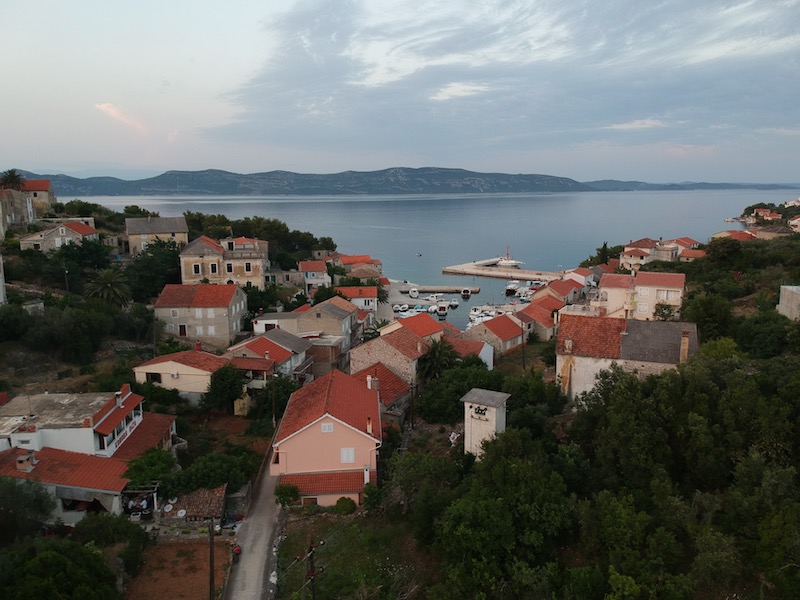
Mali Iž's port
Do I feel safe? Sure. The medical community continues to make superhuman sacrifices for everyone around them. That gives me hope.
Now compare that to your home country and how they are handling it. What is Croatia doing better/worse?
Let’s start with the better:
Croatia instituted preventative measures well ahead of time, increased the healthcare system’s capacity and stockpiled medical supplies. This made a world of difference.
Early on, politicians stepped aside and let medical professionals dictate healthcare policy, with economic policy following their lead. People as a result paid attention and, mostly, listened.
As a news junky, I have to commend the Croatian “media” — that perpetual whipping boy casually blamed for every societal ill in this country. It has never been as responsible and professional in its presentation of facts and diligent in reporting the successes and flaws in the government’s efforts. Most importantly, it’s avoiding the dangerous trap of giving time to "It's just like the flu" skeptics under the guise of “fairness”, something the US media continues to do.
This has, for now, stifled the small-yet-loud cult Croatian contrarians who think skepticism is the ultimate sign of intelligence. You know, those habitually hawking stories about fake moon landings, poisonous vaccines, chemtrails, “9/11 was an inside job”… etc. etc. etc. (Spare me the vitriolic comments and messages.)
The worse:
There is no government official shutting down talk of “life back to normal” and “loosening restrictions.” I understand the folly of constant uncertainty — it’s a political land mine. But the margin for error here is razor-thin.
The response to citizens’ economic hardships has been about the same — hodgepodge and, if you ask enough people, inadequate.
Enforcement of the self-isolation and travel restrictions is, at worst, reportedly non-existent and wholly relying on good faith.
The itch to salvage the tourism season seems to influence long-term projections. This "economy or health" debate exists on both sides of the Atlantic, despite studies showing they're actually inextricably intertwined — an ongoing pandemic does more economic damage than any measures stopping it.
Neither government is preparing citizens for the prospect of all this lasting into the autumn, which could happen if the medical community doesn't find quick testing methods and a stopgap treatment. Growing evidence also shows opening borders almost instantly starts another outbreak. Just ask Singapore, Hong Kong and Taiwan, which had the virus under control until they eased travel restrictions and allowed foreigners to enter. This is a heartbreaking, difficult conversation to have in a country married to tourism. “Your annual source of income may disappear” is a wrenching thing to say. But the sooner it occurs, the sooner people and the government can make provisions, just in case.
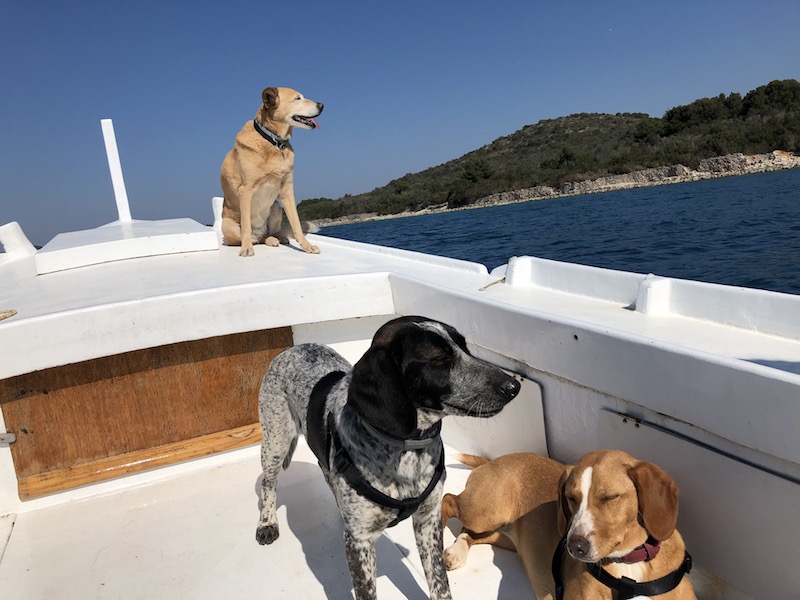
The author's COVID crew.
What about official communications from the authorities, compared to your home country?
Remember in grade school when the substitute teacher promised a reward if everyone just behaved for 10 more minutes? And then after ten minutes passed, the classroom turned into a zoo?
I get that same sensation when a member of Croatia’s Civil Protection Directorate says, “If things continue this way, we’ll be able to loosen restrictions.”
As for authorities, Croatia and the US have similar systems of decentralized power, passing enforcement and execution of national edicts down to the local level as often as possible. This leads to crossed signals.
When local directorates scuttle travel restrictions wholesale, as Istria did, one has to wonder who holds the ultimate authority. Is any of this coordinated, or voluntary?
You see much the same in the US, with governors dictating policy at a granular level, even though the coronavirus doesn’t recognize state borders.
What’s the one thing you wish you had taken with you into self-isolation?
My mother, who's riding this out in Queens, isolated at home under the constant din of blaring sirens.
One thing you have learned about yourself, and one thing you have learned about others during this crisis.
I’ve noticed two general responses to the crisis. One group sits on its hands, nervously hoping for things to go back to normal. The other smells an opportunity, while the rules are unclear and everyone’s distracted. Those scheming with novel plans might come out of this with a renewed sense of purpose and contentment. Some may even be successful.
I can say with certainty: the people handling this well don't spend much time on social media.
As for me? I see at least four crises: a pandemic, a strain on the healthcare system, an economic collapse and a mental health crisis. All are happening at once, but at various speeds. The first two are the most pressing now — getting the virus under control and keeping hospitals at capacity are the priority. But the latter two — economic and mental health — will be the lasting effects for everyone who survives this.
My relationship to all this changed when I accepted I can’t control the virus and healthcare systems beyond following the prescribed measure. But I do have some controls over the economics and mental health aspects, and working on those a little bit every day blunts the constant stream of bad news and simmering anxiety.
Mainly, I want to make sure the cats don't start talking back.
Thanks, Joe. Stay safe and see you on the other side.
TCN is starting a new feature series on foreign experiences of sitting out COVID-19 here in Croatia compared to their home country. If you would like to contribute, the questions are below. Please also include a para about yourself and where you are from, and a link to your website if you would like. Please also send 3-4 photos minimum to This email address is being protected from spambots. You need JavaScript enabled to view it. Subject Corona Foreigner
If you would be interested to record a video version for our partners www.rplus.video please let us know in the email. Thanks and stay safe.
Foreigners Self-Isolating in Croatia: Do You Feel Safer Than in Your Home Country?
Firstly, how are you? Are you alone/with someone? Tell us a little about your situation and sanity levels.
What do you think about the economic measures the government is taking, are they helping your business? (PLEASE IGNORE IF THIS DOES NOT AFFECT YOU)
When did you realise that corona was going to be a big issue?
What is your impression of the way Croatia is dealing with the crisis? How safe do you feel?
Now compare that to your home country and how they are handling it. What is Croatia doing better/worse?
What about official communications from the authorities, compared to your home country?
What's the one thing you wish you had taken with you into self-isolation.
One thing you have learned about yourself, and one thing you have learned about others during this crisis.
TCN has recently become a partner in Robert Tomic Zuber's new R+ video channel, initially telling stories about corona experiences. You can see the first TCN contribution from this morning, my video from Jelsa talking about the realities of running a news portal in the corona era below. If you would like to also submit a video interview, please find Robert's guidelines below
VIDEO RECORDING GUIDE
The video footage should be recorded so that the cell phone is turned horizontally (landscape mode).
There are several rules for television and video news:- length is not a virtue- a picture speaks more than a thousand words
In short, this would mean that your story should not last more than 90 seconds and that everything you say in the report should be shown by video (for example, if you talk about empty streets, we should see those empty streets, etc.).
How to do it with your cell phone? First, use a selfie camera to record yourself telling your story for about a minute and a half. Ideally, it would be taken in the exterior, except in situations where you are reporting on things in the interior (quarantine, hospital, self-isolation, etc.). Also, when shooting, move freely, make sure everything is not static.
After you have recorded your report, you should capture footage that will tell your story with a picture, such as an earlier example with empty streets.
One of the basic rules of TV journalism is that the story is told in the same way as a journalist with his text. Therefore, we ask you for additional effort. Because we work in a very specific situation, sometimes you may not be able to capture footage for each sentence of the report. In this case, record the details on the streets: people walking, the main features of the city where you live, inscriptions on the windows related to the virus, etc.
The same rules apply if you are shooting a story from your apartment, self-isolation, quarantine. We also need you to capture footage that describes your story.
When shooting frames to cover your reports, it is important that you change the angle of the shot (in other words, shoot that empty street from several angles). Also, when shooting a detail, count at least five seconds before removing the camera to another detail.
The material should be about 5 minutes long (90 seconds of your report + frames to cover your story).
After recording everything, send us to Zagreb, preferably via WeTransfer to This email address is being protected from spambots. You need JavaScript enabled to view it.
Wash your hands.
Croatia Enters Critical COVID-19 Period
ZAGREB, April 10, 2020 - Croatian Institute of Public Health director Krunoslav Capak said on Friday that Croatia had entered a critical period of the COVID-19 epidemic when it was necessary to carefully consider measures regarding Easter visits and greetings.
Speaking at a press conference of the national civil protection authority, he reiterated that going to supermarkets and farmers' markets must be in line with epidemiological recommendations. He said that if people in supermarkets started acting as though there was no epidemic, tighter measures would be imposed.
Capak said 11 staff and many residents of a nursing home in Split were infected with the virus and that there was one infection in a nursing home in the southern coastal town of Ploče and another one in the northern town of Koprivnica. He added that new instructions had been defined to step up protection in such facilities.
Speaking of Croatians who work abroad and are coming home for Easter, Capak said they would no longer be allowed to leave Croatia without permission from epidemiologists and that they would require a certificate that their self-isolation period had ended in order to cross the border.
Interior Minister Davor Božinović said that dealing with the epidemic depended on every citizen.
"People must accept that the times are not normal, aware that the health of their dearest ones and how soon we will come out of this crisis depends on their behaviour. Solidarity is the operative word in this crisis. We have entered a critical period and how long it will last depends only on us."
He and Health Minister Vili Beroš said all staff engaged in the fight against COVID-19 who had given their utmost would be financially rewarded, although in line with financial possibilities.
More news about coronavirus can be found in the Lifestyle section.
EU Culture Ministers Talk Measures Designed to Alleviate Impact of Coronavirus Crisis
ZAGREB, April 10, 2020 - EU culture ministers have held an informal video conference on the impact of the coronavirus pandemic on the cultural and creative sector and exchanged experience on the steps undertaken by their governments to fight the pandemic as well as proposals for action at the EU level.
The video conference, held at the proposal of Croatian Culture Minister Nina Obuljen Koržinek, was attended by EC Vice-President for Values and Transparency Vera Jourova, Innovation, Research, Culture, Education and Youth Commissioner Mariya Gabriel and Internal Market Commissioner Thierry Breton.
Obuljen Koržinek said the debate showed that all member-countries had taken action to help artists, cultural institutions and companies in the cultural and creative industries in the current crisis when cultural projects are being cancelled or postponed.
She said the participants in the meeting also discussed the public's consumption of cultural content on various online platforms.
Commissioner Jourova said that the response to the crisis should be comprehensive and emphasised the importance of the media sector, professional work of journalists and the responsibility of the media to prevent fake news and disinformation.
Commissioner Breton spoke of the measures that had been introduced on the internal market and underlined the importance of media and the audio-visual industry, while Gabriel presented activities launched by European associations, member states and the European Commission in the cultural and creative sectors to minimise the negative consequences of the pandemic for citizens.
The meeting particularly underlined the need for a flexible approach to the beneficiaries of the Creative Europe programme.
The video conference was held on April 8 and the ministers will continue their discussion at the Council of the Ministers of Culture on May 19.
More news about coronavirus can be found in the Lifestyle section.
Fortenova Group Donates Half a Million Masks to Civil Protection Directorate
As Poslovni Dnevnik writes on the 10th of April, 2020, half a million disposable protective masks were acquired and donated by the Fortenova Group (former Agrokor) to the Directorate of Civil Protection of the Ministry of the Interior. The security equipment, worth nearly two million kuna in total, which was taken today from the Konzum warehouse, is intended for users who carry out anti-epidemic health measures on the ground.
Assistant Minister Ph.D. Damir Trut thanked the Fortenova Group donation and said that it would contribute to increasing the safety of the staff involved in the task of combating the new coronavirus epidemic.
''The donation of protective masks will provide safer working conditions and the further protection for all employees, primarily those in the health system, but also for other members of the civil protection system's operational forces, so I'd like to thank you for this commendable donation. Only through joint efforts can we contribute to reducing the spread of the new coronavirus and increasing the security of all citizens of the Republic of Croatia,'' the Assistant Minister said.
Despite the enormous challenge of procuring equipment that is currently the most sought after commodity in the entire world, the Fortenova Group has been able to import more equipment, some of which is intended to protect Fortenova Group employees, with most of the masks going to those who need them most at the moment.
"Healthcare professionals, police officers, firefighters and everyone else who has been constantly concerned with the safety and health of all of us in recent weeks are invaluable. We at the Fortenova Group know this very well, as thousands of our workers are taking care to make sure there is an unobstructed level of care for Croatian citizens doing their jobs every day. Therefore, we at the Fortenova Group know a lot about the value of safety and health concerns and the importance of investing in this security at this time,'' said Fabris Peruško, CEO of the Fortenova Group.
The Fortenova Group and its companies in Croatia - Konzum, PIK Vrbovec, Jamnica, Zvijezda, Belje and Ledo have all assisted hospitals, the Croatian Red Cross and various care organisations since the beginning of the coronavirus crisis. The Group's companies operating in neighbouring Bosnia and Herzegovina and Serbia have also done the same.
"With this latest donation of protective masks, the total amount of donations from the Fortenova Group so far in the region has reached almost four million kuna in direct contributions to the communities in which we work. At the same time, this is also a way of showing gratitude to everyone who is doing their job every day, regardless of the risks,'' said CEO Fabris Peruško.
Follow our dedicated section for all you need to know about coronavirus in Croatia.

